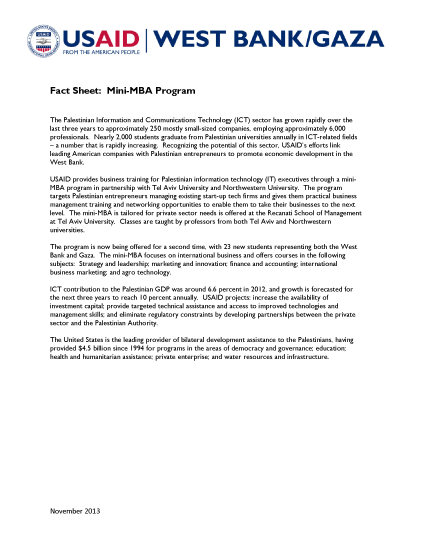The Palestinian Information and Communications Technology (ICT) sector has grown rapidly over the last three years to approximately 250 mostly small-sized companies, employing approximately 6,000 professionals. Nearly 2,000 students graduate from Palestinian universities annually in ICT-related fields – a number that is rapidly increasing. Recognizing the potential of this sector, USAID’s efforts link leading American companies with Palestinian entrepreneurs to promote economic development in the West Bank.
Fact Sheet: Mini-MBA Program ![]() (pdf - 96k)
(pdf - 96k)
USAID provides business training for Palestinian information technology (IT) executives through a mini- MBA program in partnership with Tel Aviv University and Northwestern University. The program targets Palestinian entrepreneurs managing existing start-up tech firms and gives them practical business management training and networking opportunities to enable them to take their businesses to the next level. The mini-MBA is tailored for private sector needs is offered at the Recanati School of Management at Tel Aviv University. Classes are taught by professors from both Tel Aviv and Northwestern universities.
The program is now being offered for a second time, with 23 new students representing both the West Bank and Gaza. The mini-MBA focuses on international business and offers courses in the following subjects: Strategy and leadership; marketing and innovation; finance and accounting; international business marketing; and agro technology.
ICT contribution to the Palestinian GDP was around 6.6 percent in 2012, and growth is forecasted for the next three years to reach 10 percent annually. USAID projects: increase the availability of investment capital; provide targeted technical assistance and access to improved technologies and management skills; and eliminate regulatory constraints by developing partnerships between the private sector and the Palestinian Authority.
The United States is the leading provider of bilateral development assistance to the Palestinians, having provided $4.5 billion since 1994 for programs in the areas of democracy and governance; education; health and humanitarian assistance; private enterprise; and water resources and infrastructure.
November 2013








Comment
Make a general inquiry or suggest an improvement.